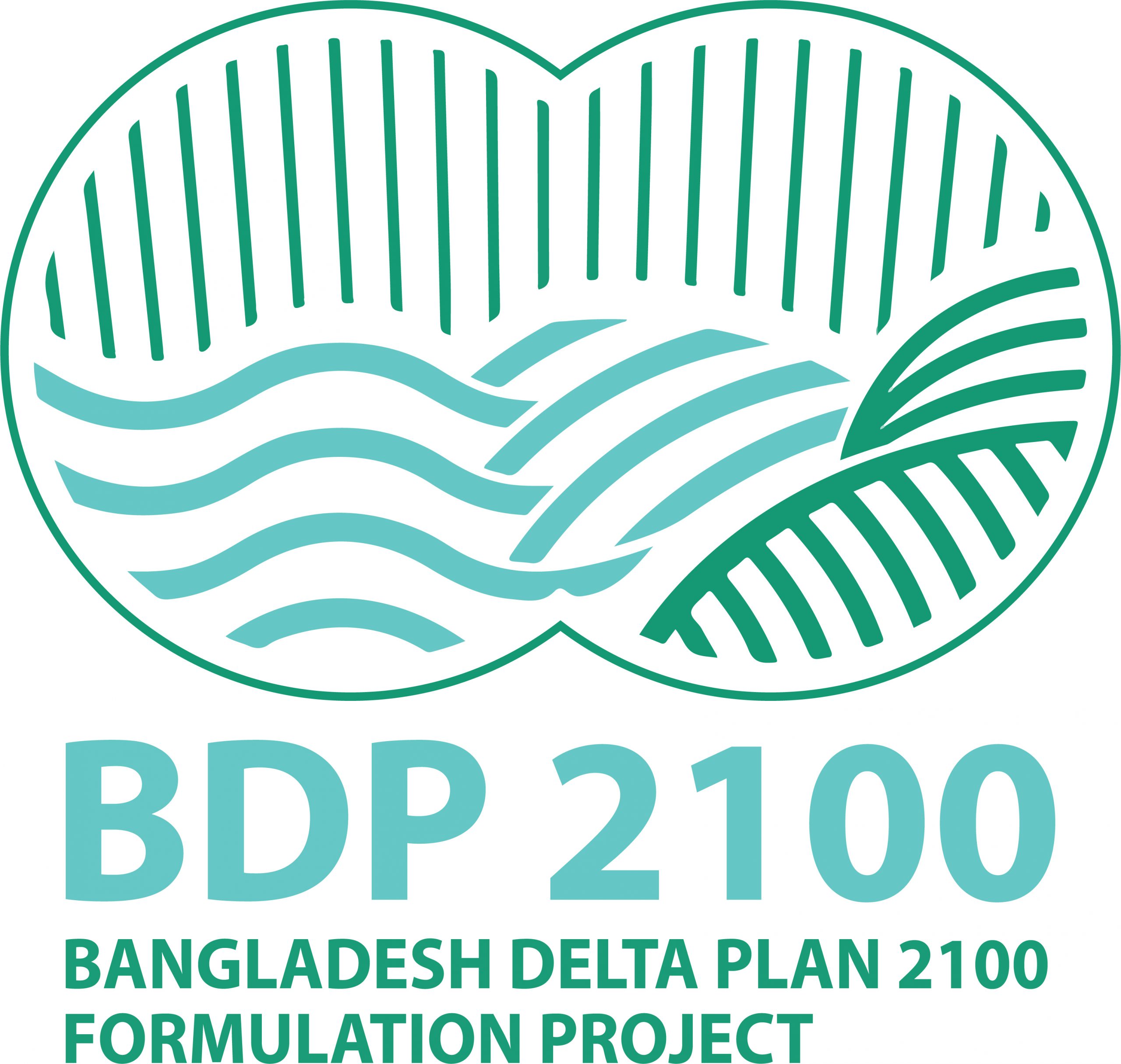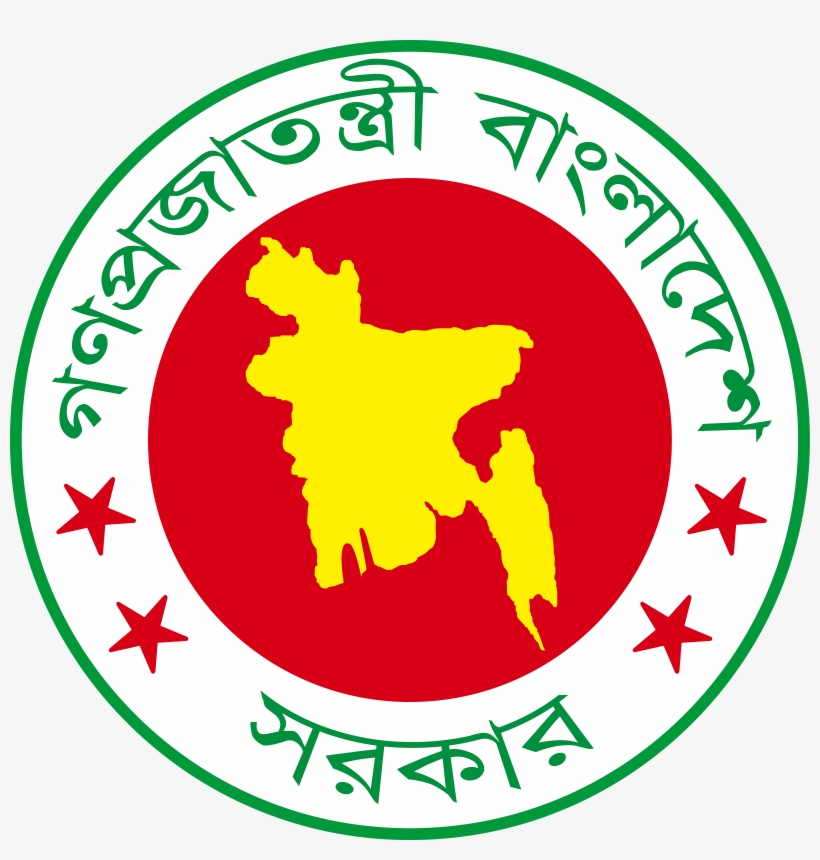The "Third Five Year Plan 1985-90" refers to a national development plan implemented in Bangladesh during the period between 1985 and 1990, focusing on economic and social development across various sectors like industry, agriculture, infrastructure, and education, aiming to improve the country's overall living standards during that timeframe.
Found 161 Results From
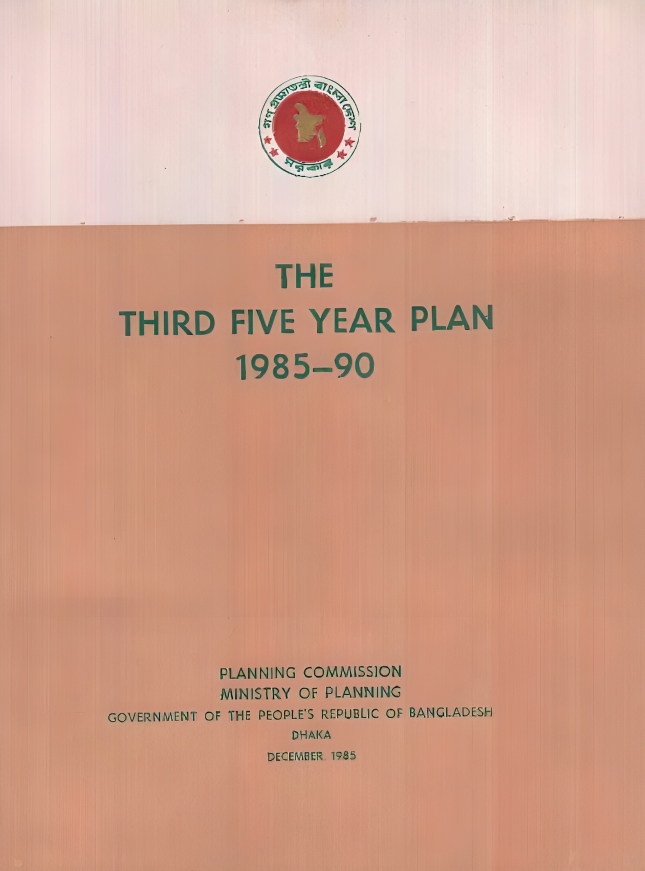
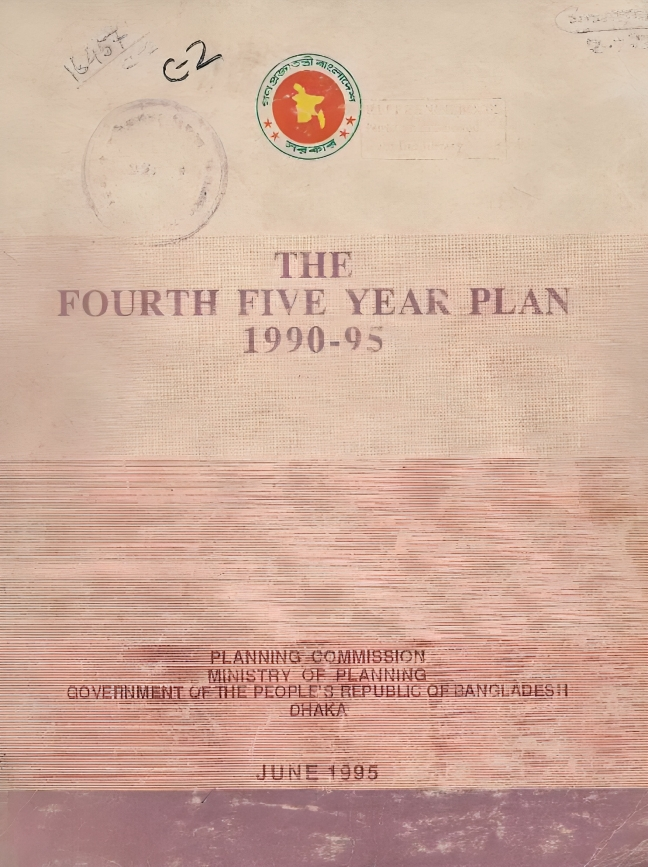
THE FOURTH FIVE YEAR PLAN 1990-95
 December 15, 2024
December 15, 2024 The Fourth Five Year Plan, 1990-95 was a plan by the Government of Bangladesh to focus on poverty alleviation, human resources development, and environmental sustainability. The plan was launched in July 1990 but was not formally approved until June 1995. The plan's main objectives were: Economic growth: To achieve an annual GDP growth rate of 5% Poverty alleviation: To generate employment through human resources development Self-reliance: To increase self-reliance The plan's allocations were: Public sector: Tk. 347 billion (56%) Private sector: Tk. 273 billion (44%) Part-1
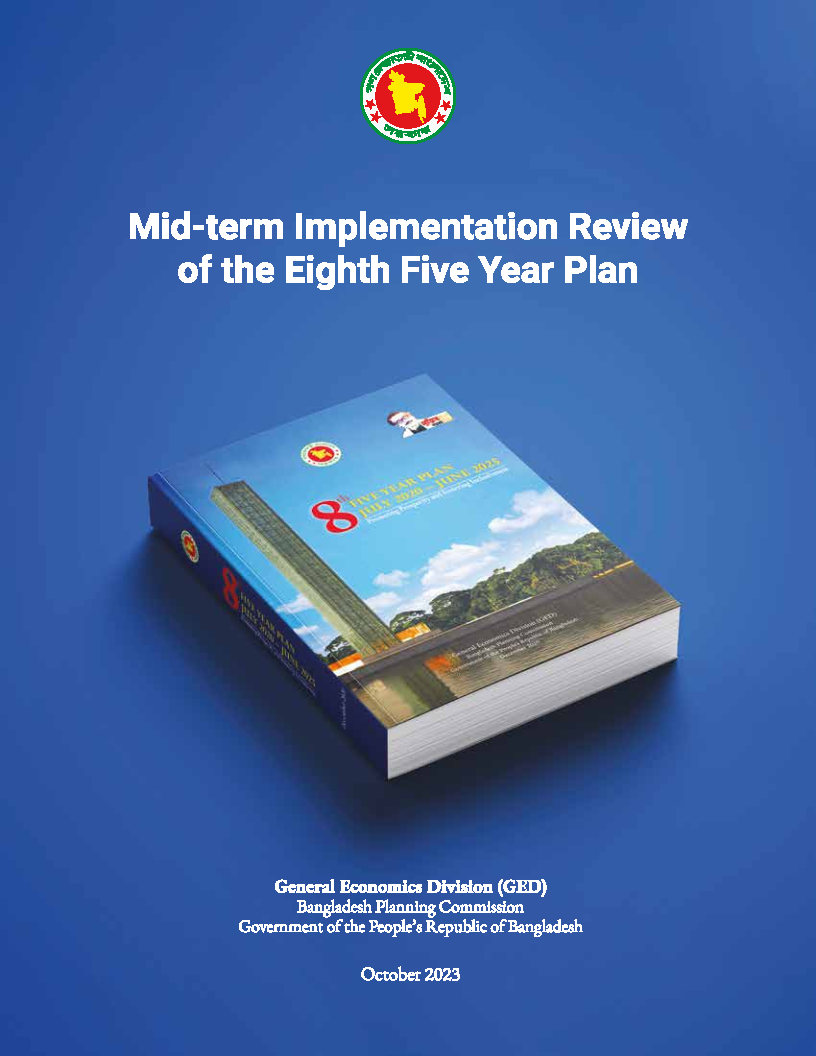
Mid-term Implementation Review of the 8th Five Year Plan
 February 25, 2024
February 25, 2024 GED initiated the preparation of the Mid-term Implementation Review of the Eighth Five Year Plant of 8FYP. The Policy Research Institute (PRI) – a reputed consulting firm of Bangladesh specializing in Economic issues was recruited to provide the consultancy services in preparing this report. In between, GED collected input/feedback on the implementation progress of 8FYP from concerned ministries/divisions and organized two workshops on 15 March 2023 on the received input. After the workshops, all ministries/divisions were requested to provide/correct/modify their input/comments again. In the whole process, concerned officials from GED were actively in touch with the focal persons from ministries/divisions. Once the draft of the report was prepared, GED conducted another consultation workshop with ministries/divisions on 23 August 2023 for their on the draft report. The final report incorporated all the information and feedback received from the ministries/division. GED also formed a technical committee comprised of representatives from various government organizations, i.e., Finance Division (FD), Economic Relations Division (ERD, Ministry of Commerce, Bangladesh Bank, Bangladesh Bureau of Statistics (BBS), and Bangladesh Institute of Development Studies (BIDS). This committee sat several times to critically review the macroeconomic aspect of the draft review report and recommended it accordingly.
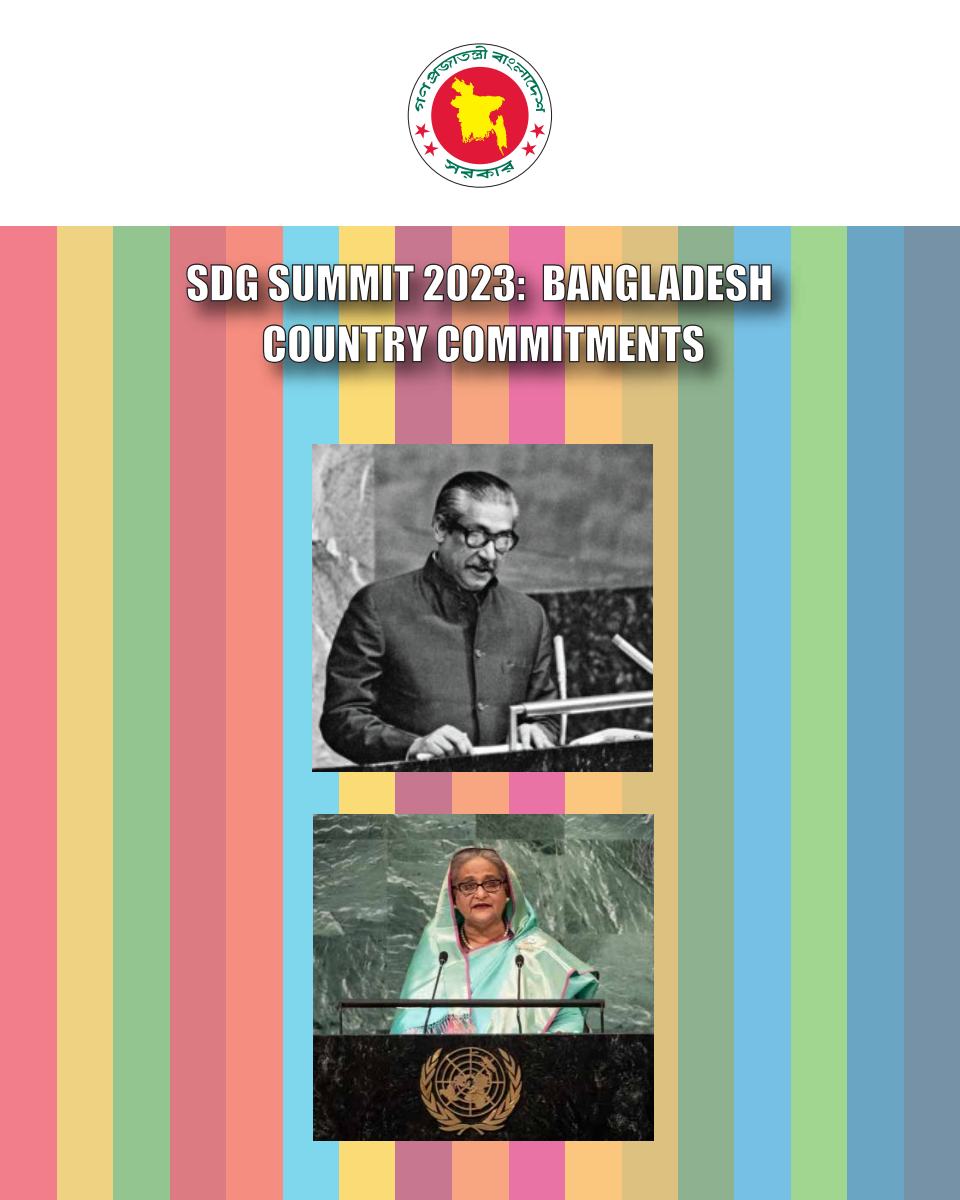
SDG SUMMIT 2023: BANGLADESH COUNTRY COMMITMENTS
 October 9, 2023
October 9, 2023 Bangladesh has wholeheartedly embraced the Sustainable Development Goals (SDGs), aligning them with its development agenda to prioritize the well-being of its people. The government has integrated the SDGs into its Eighth Five Year Plan (2021-2025), with 66 out of 104 monitoring indicators directly linked to the SDGs. This alignment reflects the values of its leaders, including Father of the Nation Bangabandhu Sheikh Mujibur Rahman and Prime Minister Sheikh Hasina, who emphasized similar themes during their United Nations speeches.
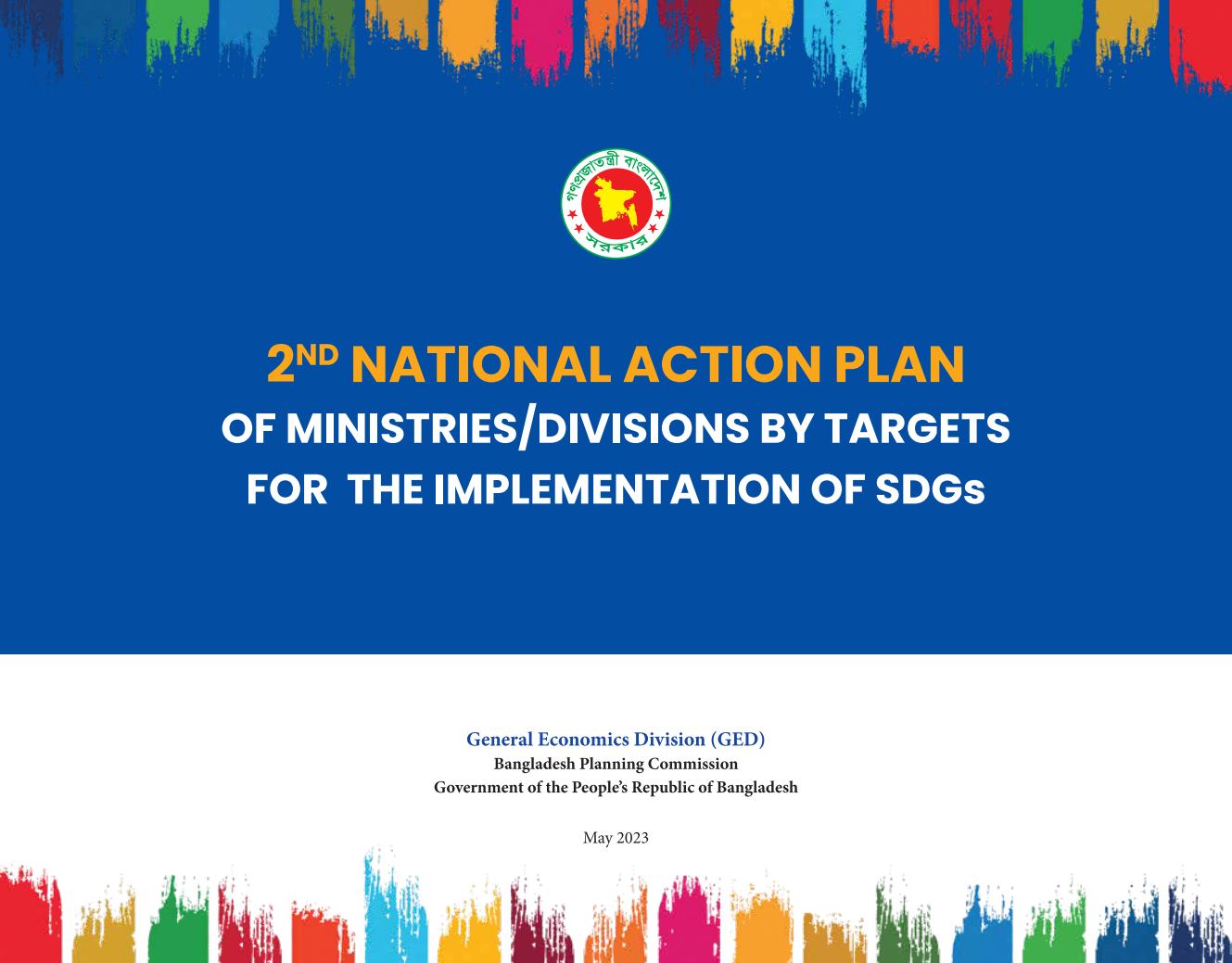
2nd National Action Plan of Ministries/Divisions by Targets for the Implementation of SDGs
 August 27, 2023
August 27, 2023 The ‘2nd National Action Plan of Ministries/Divisions by Targets for the Implementation of SDGs’ is a comprehensive strategy that encompasses the actions of various Ministers/Divisions identified in the SDGs Mapping Handbook. This Actin Plan is designed to effectively implement the goals and associated targets outlined in the SDGs, spanning three consecutive Five Year Plans (7th, 8th, and 9th FYP) in alignment with the Development Budgetary provisions of the Government of Bangladesh.
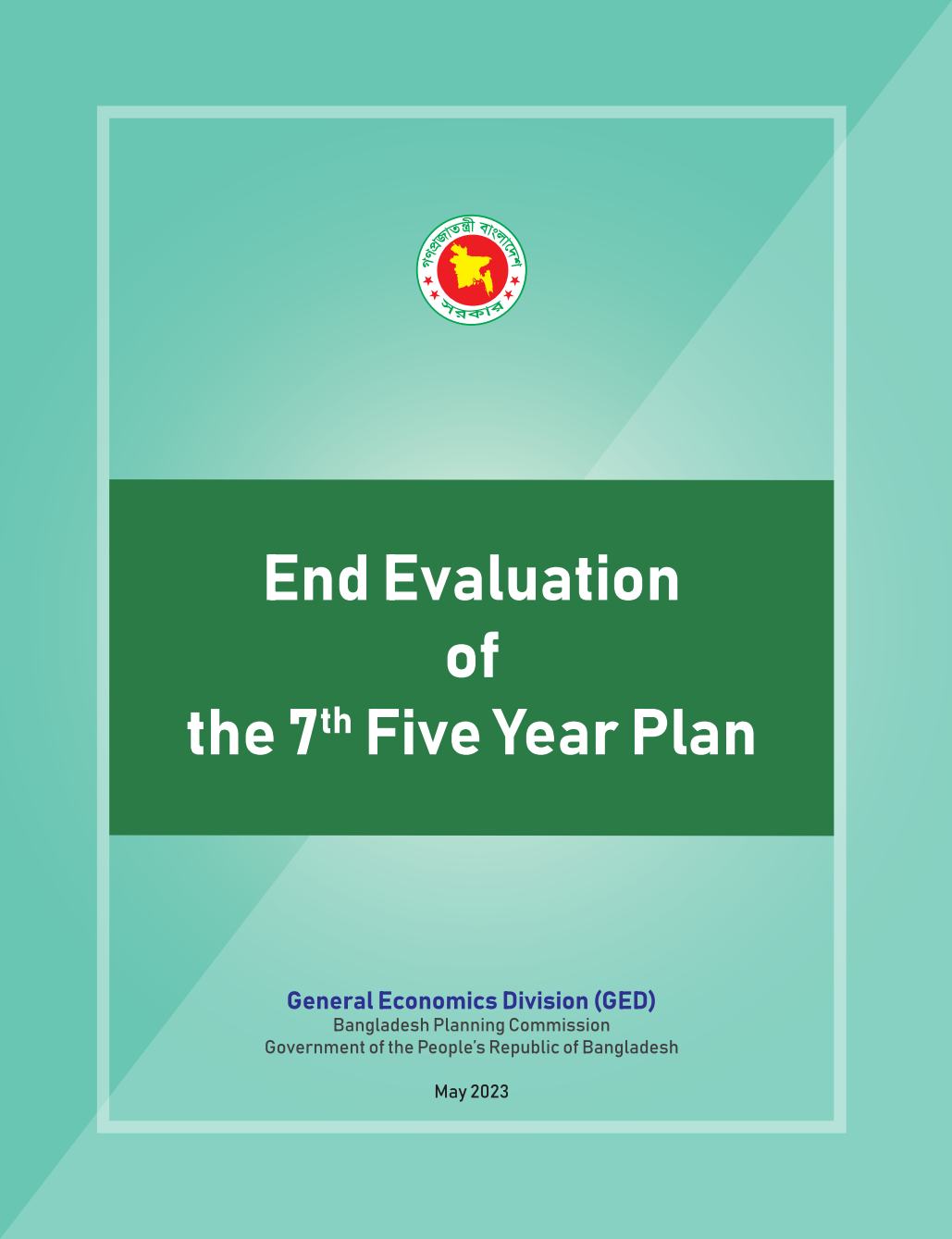
End Evaluation of the 7th Five Year Plan
 August 27, 2023
August 27, 2023 The 7th Five-Year Plan of Bangladesh was formulated with the primary objective of achieving accelerated economic growth, reducing poverty, improving human development indicators, and fostering equitable socio-economic progress. It was a crucial milestone for Bangladesh as it sought to address various developmental priorities and propel the nation toward sustainable growth and inclusive development. The plan incorporated a comprehensive set of strategies, policies, and programs spanning various sectors, including agriculture, industry, infrastructure, education, healthcare, and social protection. These initiatives aimed to leverage the country’s potential, capitalize on emerging opportunities, and address the persistent challenges faced by Bangladesh. A rigorous approach and methodological framework were followed for the End Evaluation of the 7th Five Year Plan. This requires a comprehensive understanding of the Plan documents (i.e., the Seventh Plan and the Perspective Plan) and their development results frameworks (DRFs); the collection and analysis of relevant data; and the provision of insightful assessments that are not limited to merely describing the data but also providing rationale. Analysis of quantitative data has been supplemented with qualitative data obtained from a desk review of various policy documents and Key Informant Interviews (KIIs) and information received from the ministries and divisions. GED formulated this report after brief consultations with executing ministries/ divisions. In this process, concerned officials from GED were actively in touch with the focal persons from ministries/divisions.
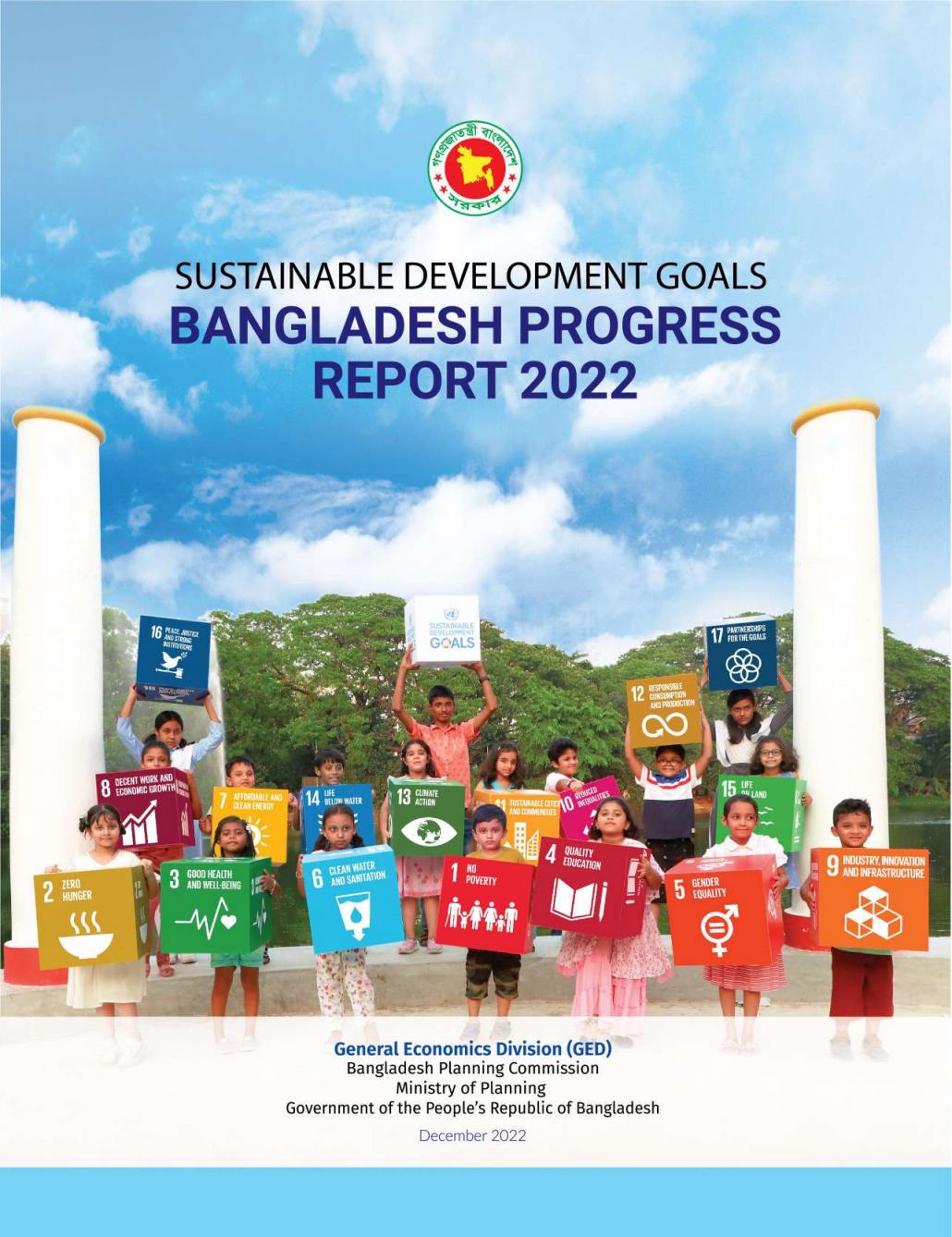
Sustainable Development Goals Bangladesh Progress Report 2022
 February 15, 2023
February 15, 2023 The Government of Bangladesh is striving towards the ambitious goal of reaching the furthest behind first, through adopting the ‘whole-of-society’ approach and implementing the ‘leaving no one behind’ agenda. Since 2020, the challenge of achieving the SDGs has been magnified by an increase in the frequency and intensity of human-made crises and natural disasters in the global economy, as well as the challenges of responding to the Covid-19 pandemic. Although the economy started to rebound in 2021, it slowed down again towards the end of the year due to new Covid-19 variants and continued global vaccine inequity, along with rising inflation, supply chain disruptions, policy uncertainties, and the global impact of the Russia-Ukraine war. The Sustainable Development Goals Bangladesh Progress Report 2022 provides an analysis of progress on 17 SDGs and 169 targets in Bangladesh where there are unique challenges, resources, and opportunities for progress. The report also provides an analysis of data gaps that constrain the monitoring of progress along with potential sources and priority areas that the government is exploring for enhancing SDG data availability.
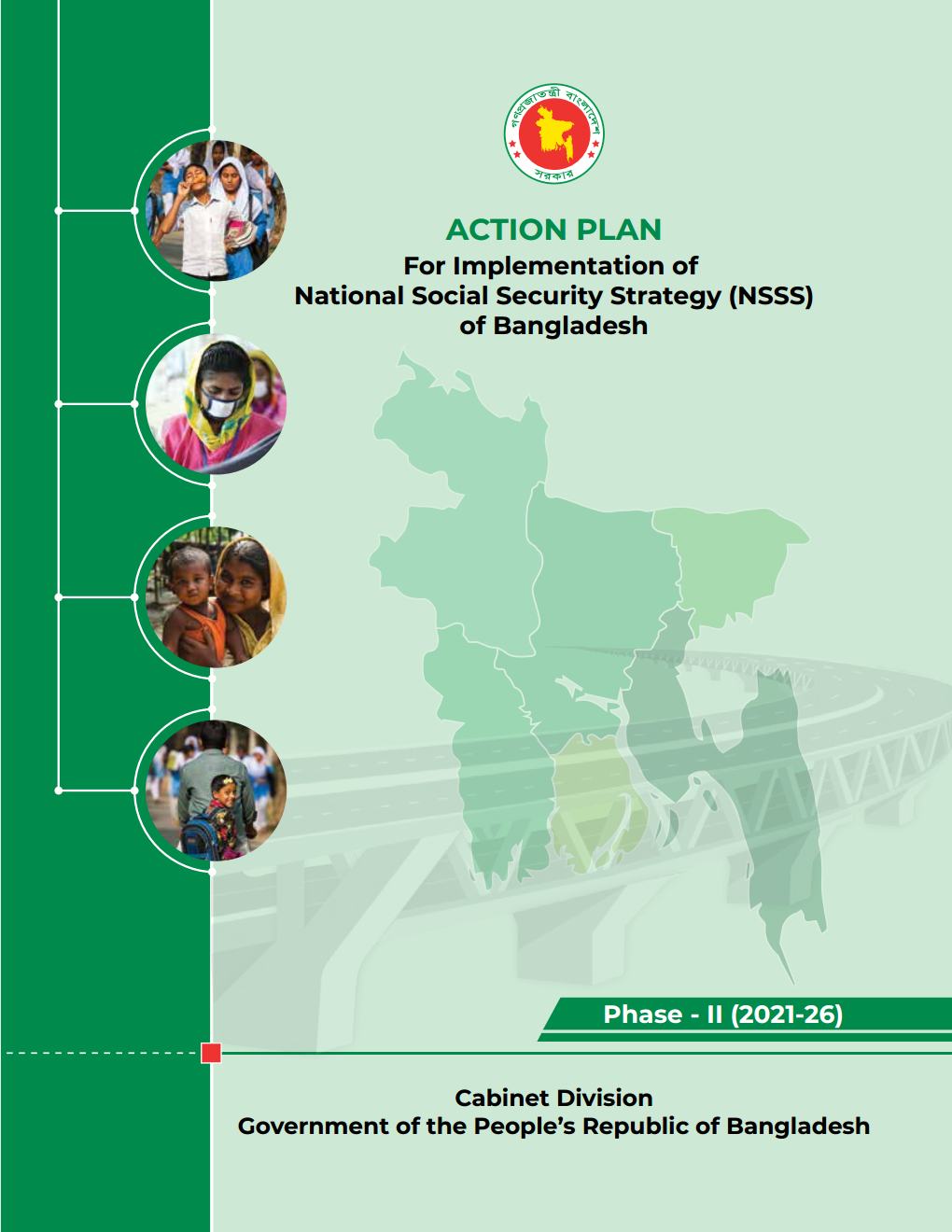
Action Plan For Implementation of National Social Security Strategy (NSSS) of Bangladesh
 January 19, 2023
January 19, 2023 The Action Plan, Phase-2 of National Social Security Strategy (NSSS) has been prepared under the overall guidance and supervision of the NSSS Action Plan Sub-Committee. The Sub-Committee was headed by Mr. Md. Kamal Hossain, as the Secretary, Coordination and Reforms who completed the stakeholder consultation and drafting of the Action Plan. However, after his subsequent transfer to another ministry, Mr. Md. Shamsul Arefin took over as the Secretary and led the finalization process of the action plan and its publication. Mr. Md. Rahat Anwar, Additional Secretary (Coordination) anchored the overall formulating process as the Member Secretary of the sub-committee. Mr. Mohammad Khaled Hasan, Joint Secretary, Civil Registration and Social Security of Cabinet Division supported the committee in designing and drafting of the action plan. The Action Plan was approved and endorsed by an inter-ministerial committee constituted by order of the Hon’ble Prime Minister, titled as Central Management Committee (CMC) on Social Security with Cabinet Secretary as its convenor. The NSSS Action Plan incorporates social security action plans of five thematic clusters and 39 ministries. The focal points, alternative focal points and other relevant officials of the ministries prepared their respective action plans, guided, and assisted by the Cabinet Division through series of workshops. The ministries finalized their parts of action plans in consultation with their stakeholders and with approval of the appropriate authority. The overall technical supports including background research and compilation of the document were provided by the SSPS Programme. Other projects of the Cabinet Division supplied inputs relating to relevant parts of the Action Plan.
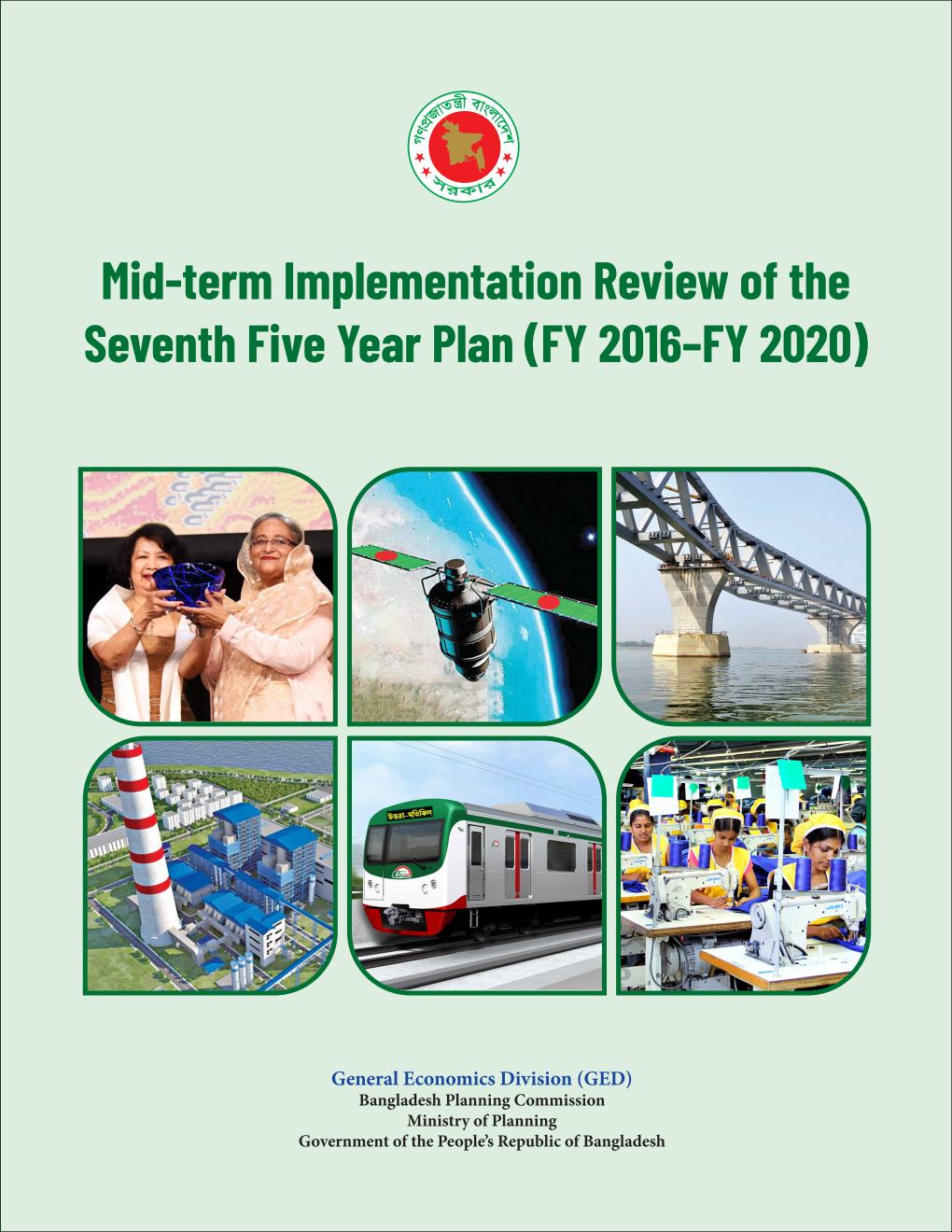
Mid-term Implementation Review of the Seventh Five Year Plan (FY 2016–FY 2020) (FY 2016, FY 2017 and half of FY 2017-18)
 December 1, 2022
December 1, 2022 The fist Perspective Plan of Bangladesh covering 2010 to 2021 is being implemented under two five year plans – namely the Sixth Five Year (2010-2015) and the Seventh Five Year (2016-2020). The Sixth Five Year plan has already been implemented. During the implementation of the Sixth Plan two evaluations were carried out – one in 2012 and the other one in 2014. The Seventh Five Year Plan was adopted in 2016 covering 2016 to 2020 period. Successful implementation on any plan – short, medium and long – depends critically on the rigorous monitoring of targets. Following that tradition, review of the implementation of the fist two years of the 7th FYP have been conducted. The main findings of the implementation review of the 7th FYP have been discussed in this report.
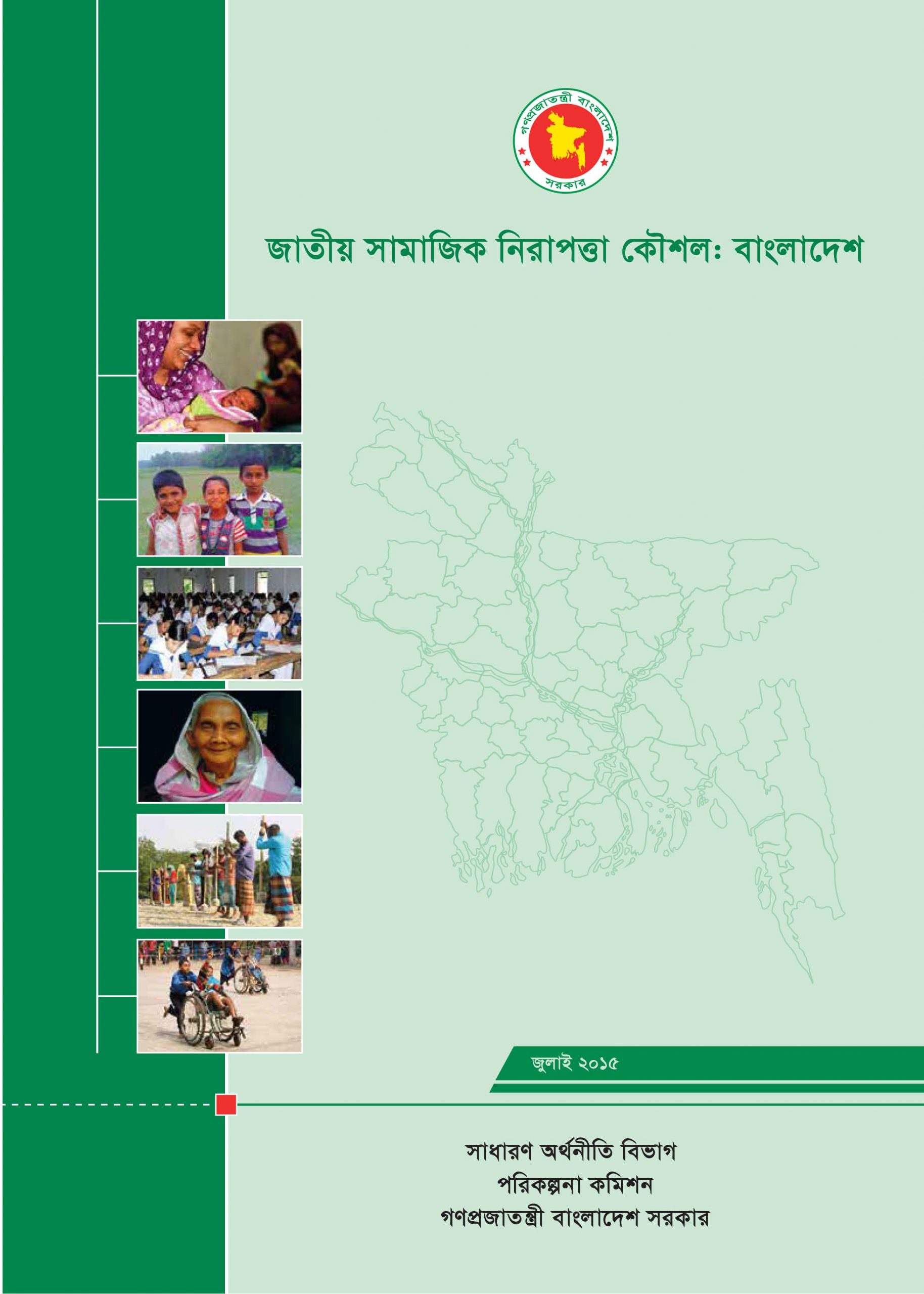
জাতীয় সামাজিক নিরাপত্তা কৌশল: বাংলাদেশ (বাংলা ভার্সন)
 October 26, 2022
October 26, 2022 বাংলাদেশ সরকার দেশের দারিদ্র্য ও বৈষম্য হ্রাসে এবং জনসাধারণের জীবনমানের উন্নয়নে দৃঢ় অঙ্গীকারবদ্ধ। সরকারের এ অঙ্গীকার বিধৃত হয়েছে রূপকল্প ২০২১, প্রেক্ষিত পরিকল্পনা (২০১০-২০২১) এবং ষষ্ঠ পঞ্চবার্ষিক পরিকল্পনা (২০১১-২০১৫) দলিলে। এ প্রতিশ্রæতির অভীষ্ট লক্ষ্য হলো দারিদ্র্য হ্রাসে ইতোমধ্যে অর্জিত অগ্রগতিকে ভিত্তি করে এগিয়ে যাওয়ার পাশাপাশি দারিদ্র্যের প্রকৃত কারণ উদ্ঘাটন ও তার টেকসই সমাধান। পাশাপাশি, দরিদ্র জনগণ যে সকল ঝুঁকিতে রয়েছে তার প্রভাব কমানোর মাধ্যমে এ অগ্রযাত্রাকে দৃঢ়তর ভিত্তির উপর প্রতিষ্ঠিত করাও এর লক্ষ্যভুক্ত। এটি অনস্বীকার্য যে দারিদ্র্য দূরীকরণে সরকারের অতীত সাফল্য প্রশংসনীয় হলেও জনগণের উল্লেখযোগ্য অংশ নানাবিধ কারণে এখনো দারিদ্র্যঝুঁকিতে রয়ে গেছে যাদের মধ্যে দারিদ্র্যসীমার নীচে অবস্থানকারী জনগোষ্ঠী ছাড়াও রয়েছে দারিদ্র্যসীমার কিছুটা উপরে অবস্থানকারী কিন্তু নানা কারণে দারিদ্র্যসীমার নীচে চলে যাওয়ার ঝুঁকিতে থাকা মানুষজন। দেখা গেছে, দরিদ্র ও প্রায়-দরিদ্র মানুষেরা তাদের নিজস্ব সম্পদ দিয়ে এসব ঝুঁকি ও বিপর্যয় মোকাবেলা করতে সক্ষম হয় না। এসব ঝুঁকি মোকাবেলায় দরিদ্র ও ঝুঁকিগ্রস্ত জনগোষ্ঠীকে সহায়তাকল্পে সরকারের বিভিন্ন সামাজিক নিরাপত্তা বেষ্টনী কর্মসূচি চলমান রয়েছে। বাংলাদেশ পরিসংখ্যান ব্যুরো (বিবিএস) পরিচালিত খানা আয়-ব্যয় জরিপে দেখা গেছে, দরিদ্র ও দারিদ্র্যঝুঁকিতে থাকা জনগোষ্ঠীর জন্য গৃহীত এসব কর্মসূচির আওতা ও পরিধি সময়ের সাথে সাথে বেড়েছে। কিন্তু তথ্য-প্রমাণ থেকে এটাও দেখা যায় যে, দরিদ্র জনগোষ্ঠীর উল্লেখযোগ্য অংশ এখনো এসব কর্মসূচির আওতায় আসেনি। তাছাড়া, নিরাপত্তা বেষ্টনী কর্মসূচিসমূহ থেকে প্রাপ্ত গড় সুবিধার পরিমাণ খুবই কম এবং প্রকৃত মূল্যে তা ক্রমান্বয়ে হ্রাস পাচ্ছে। ফলে একটি কার্যকর সামাজিক নিরাপত্তা ব্যবস্থার অধীনে গৃহীত দারিদ্র্য বিমোচন কর্মসূচিতে ব্যয়িত অর্থের যে প্রভাব থাকা উচিত সে তুলনায় এসব কর্মসুচিতে ব্যয়িত অর্থের প্রভাব অনেক কম। সামাজিক নিরাপত্তামূলক কর্মসূচিতে বিরাজমান বিভিন্ন সমস্যাকে বিবেচনায় নিয়ে বাংলাদেশ সরকার একটি সমন্বিত ও ব্যাপকভিত্তিক জাতীয় সামাজিক নিরাপত্তা কৌশল প্রণয়নের উদ্যোগ গ্রহণ করেছে। এ পরিপ্রেক্ষিতে ২০১২ সালের ১০ সেপ্টেম্বর অনুষ্ঠিত মন্ত্রিসভা বৈঠকে পরিকল্পনা কমিশনের সাধারণ অর্থনীতি বিভাগ (জিইডি)-কে জাতীয় সামাজিক নিরাপত্তা কৌশল (এনএসএসএস) প্রণয়নের দায়িত্ব অর্পণ করা হয়। মন্ত্রিপরিষদ সচিবের নেতৃত্বাধীন সামাজিক নিরাপত্তা বেষ্টনী কর্মসূচি বিষয়ক কেন্দ্রীয় ব্যবস্থাপনা কমিটির (সিএমসি) তত্তাবধানে জিইডি এ কৌশল প্রণয়ন করবে বলে সিদ্ধান্ত গৃহীত হয়। কৌশল প্রণয়নের কর্মপরিধি নির্ধারণ ও সার্বিক তত্তাবধানের দায়িত্বও এই কমিটির উপর ন্যস্ত হয়। এ কৌশলের বিষয়বস্তু ও সুপারিশমালা রচনায় সহায়তাকল্পে আঞ্চলিক ও জাতীয় পর্যায়ে উল্লেখযোগ্য সংখ্যক কর্মশালা, আলাপ-আলোচনা ও সংলাপ আয়োজনের ব্যবস্থা গ্রহণ করা হয়। এ পরিপ্রেক্ষিতে বলা যায়, জাতীয় সামাজিক নিরাপত্তা কৌশল হলো বাংলাদেশের রাজনৈতিক, সামাজিক ও অর্থনৈতিক বাস্তবতা বিবেচনায় প্রণীত সম্পূর্ণভাবে একটি দেশজ কৌশল। সামাজিক নিরাপত্তার ক্ষেত্রে বাংলাদেশের সমৃদ্ধ অতীত অভিজ্ঞতার উপর ভিত্তি করে জাতীয় সামাজিক নিরাপত্তা কৌশল প্রণয়ন করা হয়েছে। এ কৌশলের লক্ষ্য হলো বিদ্যমান সামাজিক নিরাপত্তা বেষ্টনী কর্মসূচিগুলির পরিমার্জন ও সংশ্লেষণের মাধ্যমে এগুলিকে আরও নিখুঁত, দক্ষ ও কার্যকর করে তোলা এবং ব্যয়িত অর্থ থেকে সবার্ধিক সুবিধা অর্জন নিশ্চিত করা। এটি সনাতনী ধারণার পরিবর্তে একটি ব্যাপক ও বিস্তৃত পরিধির আধুনিক সামাজিক নিরাপত্তা ব্যবস্থার প্রচলন ঘটাবে। এই নতুন ব্যবস্থায় ২০২১ সালে মধ্যম আয়ের বাংলাদেশের (যখন অতিদরিদ্র মানুষের সংখ্যা হবে ৫ শতাংশের চেয়ে কম) বাস্তবতায় কর্মসংস্থান নীতি ও সামাজিক বিমা ব্যবস্থাকে অন্তর্ভুক্ত করা হয়েছে। আওতা ও পরিধি বিস্তৃত করার মাধ্যমে এবং কর্মসূচির নকশা ও আদলের উন্নয়ন ঘটিয়ে এ কৌশল একদিকে যেমন আয় বৈষম্য কমাতে সহায়তা করবে, তেমনি অন্যদিকে এটি মানব উন্নয়ন প্রক্রিয়াকে শক্তিশালী করার মাধ্যমে উচ্চতর প্রবৃদ্ধি অর্জনে ভূমিকা রাখবে। সামাজিক নিরাপত্তার এই জাতীয় কৌশলে কেবলমাত্র বাংলাদেশের বাস্তবতাই প্রতিফলিত হয়নি, পাশাপাশি এতে প্রাসঙ্গিক আন্তর্জাতিক দৃষ্টান্তলব্ধ জ্ঞান ও ধারণাও অধিগ্রহণ করা হয়েছে। এই কৌশল প্রণয়নের ভিত্তি হিসেবে সংশ্লিষ্ট বিভিন্ন বিষয়ে আন্তর্জাতিক ও দেশীয় বিশেষজ্ঞদের দ্বারা ১০ টি পটভূমিপত্র (ব্যাকগ্রাউন্ড পেপার) রচনার উদ্যোগ গৃহীত হয়।
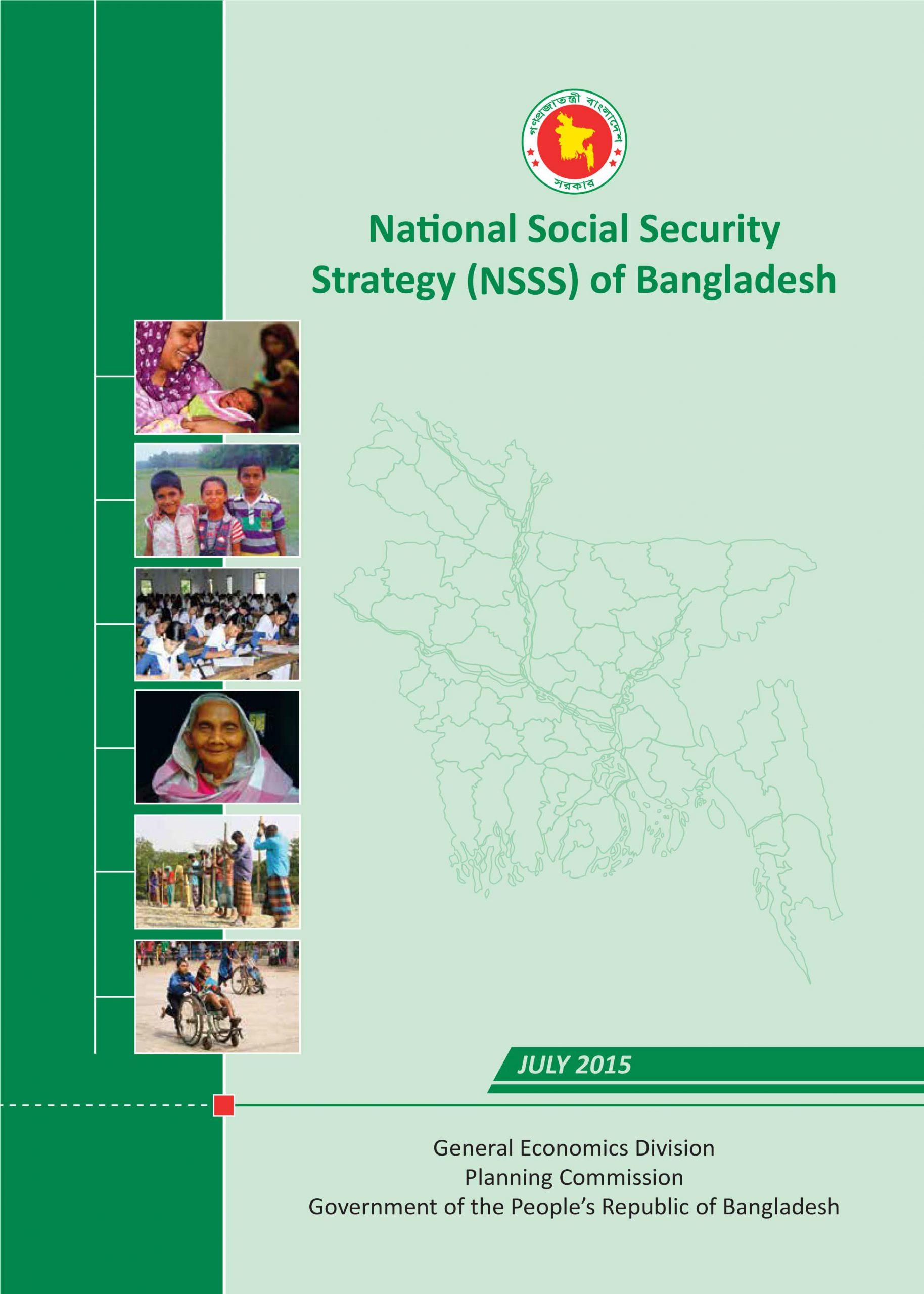
National Social Security Strategy (NSSS) of Bangladesh (English Version)
 October 26, 2022
October 26, 2022 The Government of Bangladesh is strongly committed to reducing poverty, improving human development and reducing inequality. This commitment is reflected in Vision 2021, the Perspective Plan of Bangladesh 2010-2021 and in the Sixth Five Year Plan FY11-FY15. The Government seeks to build on past progress with poverty reduction and further deepen this progress by addressing the root causes of poverty and by lowering the impact of risks faced by the poor and vulnerable population. The Government appreciates that notwithstanding the past impressive progress with poverty reduction, there is a substantial population that remains exposed to poverty owing to various vulnerabilities. These include the population that remains under the poverty line and those that are just above the poverty line but could easily fall below the poverty line because of these vulnerabilities. Evidence shows that the poor and vulnerable group cannot cope with all the downside risks and shocks with their own resources. The present safety net programmes reflect the Government’s response to support the poor and the vulnerable population manage those risks. Household Income and Expenditure Surveys (HIES) show that the coverage of these programmes for the poor and vulnerable households has increased and they have helped lower poverty. But data also suggest that a large proportion of the poor and vulnerable households do not have any access to these programmes. The average benefit of safety net programmes is low. There is considerable leakage of allocated funds and a significant percentage of household beneficiaries are non-poor. Consequently, the impact on poverty reduction from the amount of money spent in these programmes is less than is possible with a better Social Security system. In recognition of these concerns, the Government of Bangladesh has embarked upon the formulation of a comprehensive National Social Security Strategy (NSSS). The Cabinet meeting held on 10th September 2012 entrusted the General Economics Division (GED) of the Planning Commission to prepare the National Social Security Strategy (NSSS) under the guidance of a Central Management Committee (CMC) for the Social Safety Net Programmes Chaired by the Cabinet Secretary. The CMC provided the terms of reference and overall guidance to the formulation of the NSSS. A Framework Paper was prepared by GED, endorsed by the 11-member Sub-committee of CMC led by Cabinet Division and approved by the Ministry of Planning. A strong process of regional and national consultations helped shape the contents and recommendations of the NSSS. In this regard, the NSSS is fully home-grown and based on the political, social and economic realities of Bangladesh. The NSSS builds on the past rich experience of Bangladesh and seeks to streamline and strengthen the existing safety net programmes with a view to achieving better results from money spent. It also broadens the scope of Social Security from the narrow safety net concept to include employment policies and social insurance to address the emerging needs of a middle income Bangladesh in 2021 and ahead. By broadening the scope and coverage and by improving programme design the NSSS will help lower income inequality and contribute to higher growth by strengthening human development. While the NSSS reflects the realities of Bangladesh, to the extent relevant it also draws on good practice international experience. To facilitate the preparation of the NSSS ten background papers, prepared by a team of international and local experts, were commissioned on the various issues relating to the NSSS
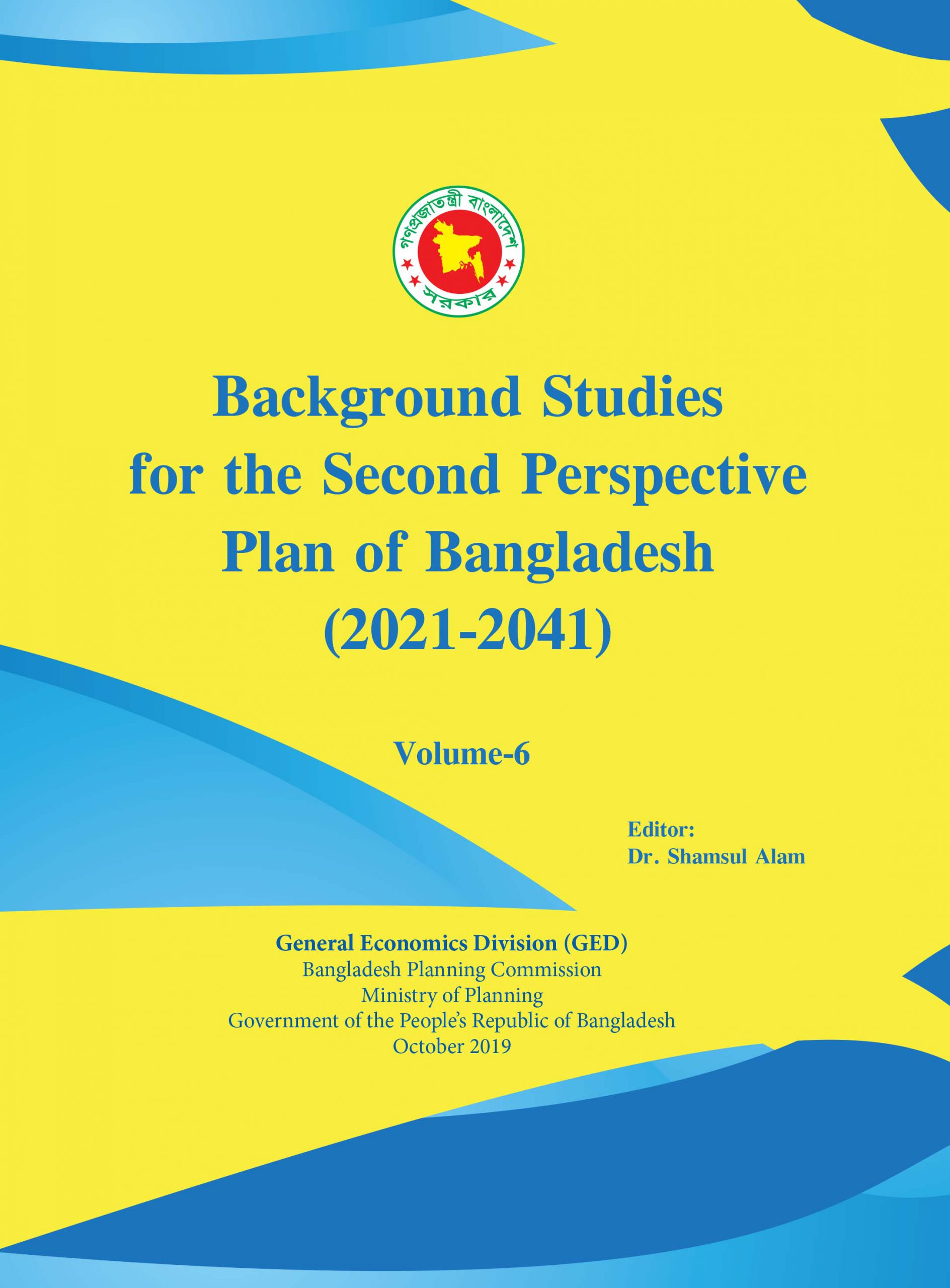
Background Studies for the Second Perspective Plan of Bangladesh (2021-2041): Volume-06
 September 6, 2022
September 6, 2022 These background studies provided valuable information/inputs which significantly contributed towards drafting the Second Perspective Plan. These studies are rich in contents and, if made available, will enrich the knowledge base relating to development challenges and development options facing Bangladesh. In view of the importance of these studies, it has been decided that GED will publish these studies for making these available to interested readers, researchers and academia. The background papers have been published in six separate volumes. It is expected that these volumes will help the readers to understand the rational for the choice of the specific domain underlying the Plan and the design of the policy package adapted for the Plan for reconciling the goals of effiency with those of equity. The studies attempted to spell out a reform strategy and agenda for agriculture, food security, industrialization, poverty reduction, social inclusion, transportation, quality infrastructure, sustainable management of natural resources, and other development issues like governance, gender, urban development, service sector development, health and population management, human development, ICT and information highway, employment and labour market in the light of current conditions as well as past experience trends.
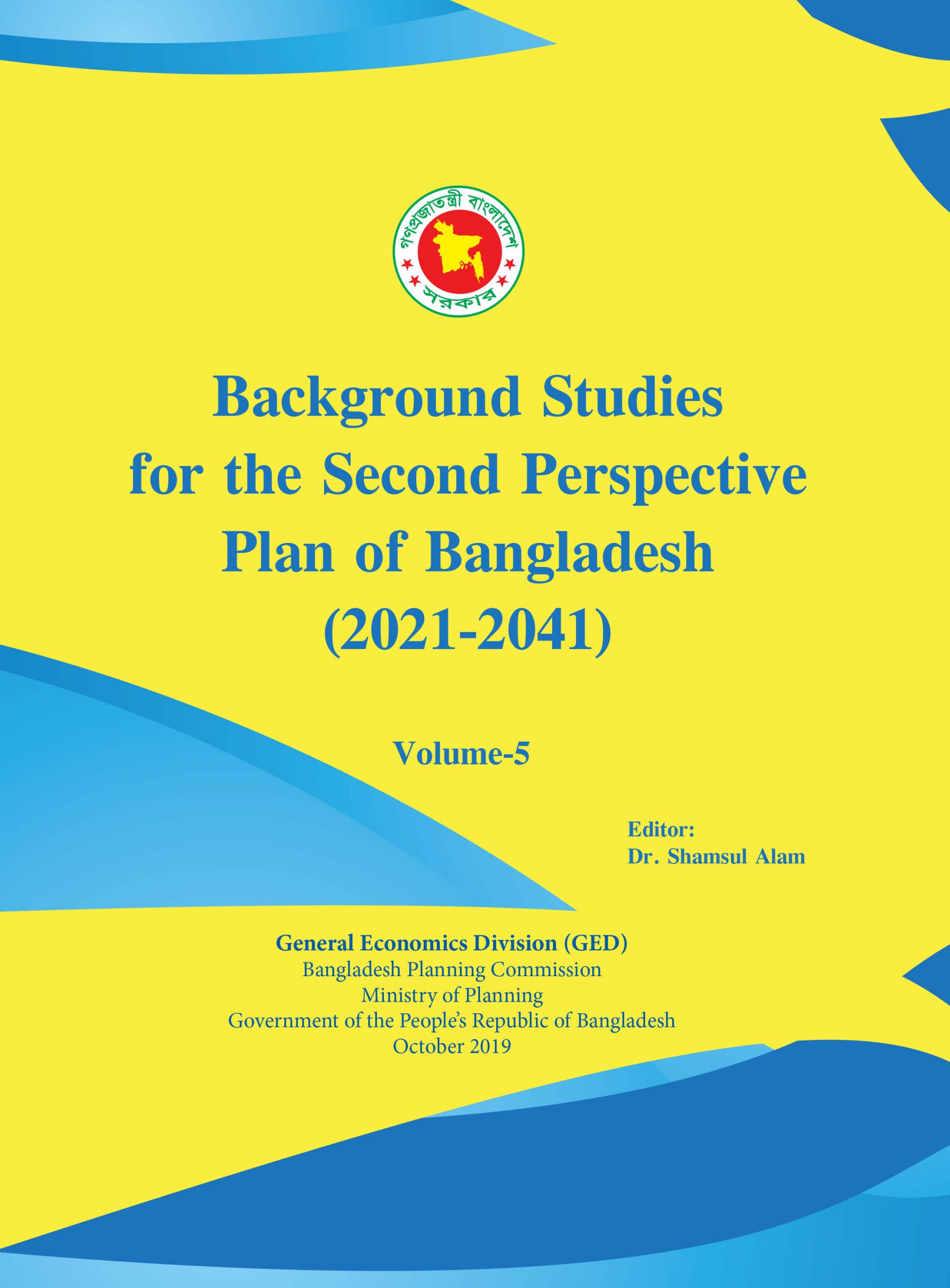
Background Studies for the Second Perspective Plan of Bangladesh (2021-2041): Volume-05
 September 6, 2022
September 6, 2022 These background studies provided valuable information/inputs which significantly contributed towards drafting the Second Perspective Plan. These studies are rich in contents and, if made available, will enrich the knowledge base relating to development challenges and development options facing Bangladesh. In view of the importance of these studies, it has been decided that GED will publish these studies for making these available to interested readers, researchers and academia. The background papers have been published in six separate volumes. It is expected that these volumes will help the readers to understand the rational for the choice of the specific domain underlying the Plan and the design of the policy package adapted for the Plan for reconciling the goals of effiency with those of equity. The studies attempted to spell out a reform strategy and agenda for agriculture, food security, industrialization, poverty reduction, social inclusion, transportation, quality infrastructure, sustainable management of natural resources, and other development issues like governance, gender, urban development, service sector development, health and population management, human development, ICT and information highway, employment and labour market in the light of current conditions as well as past experience trends.
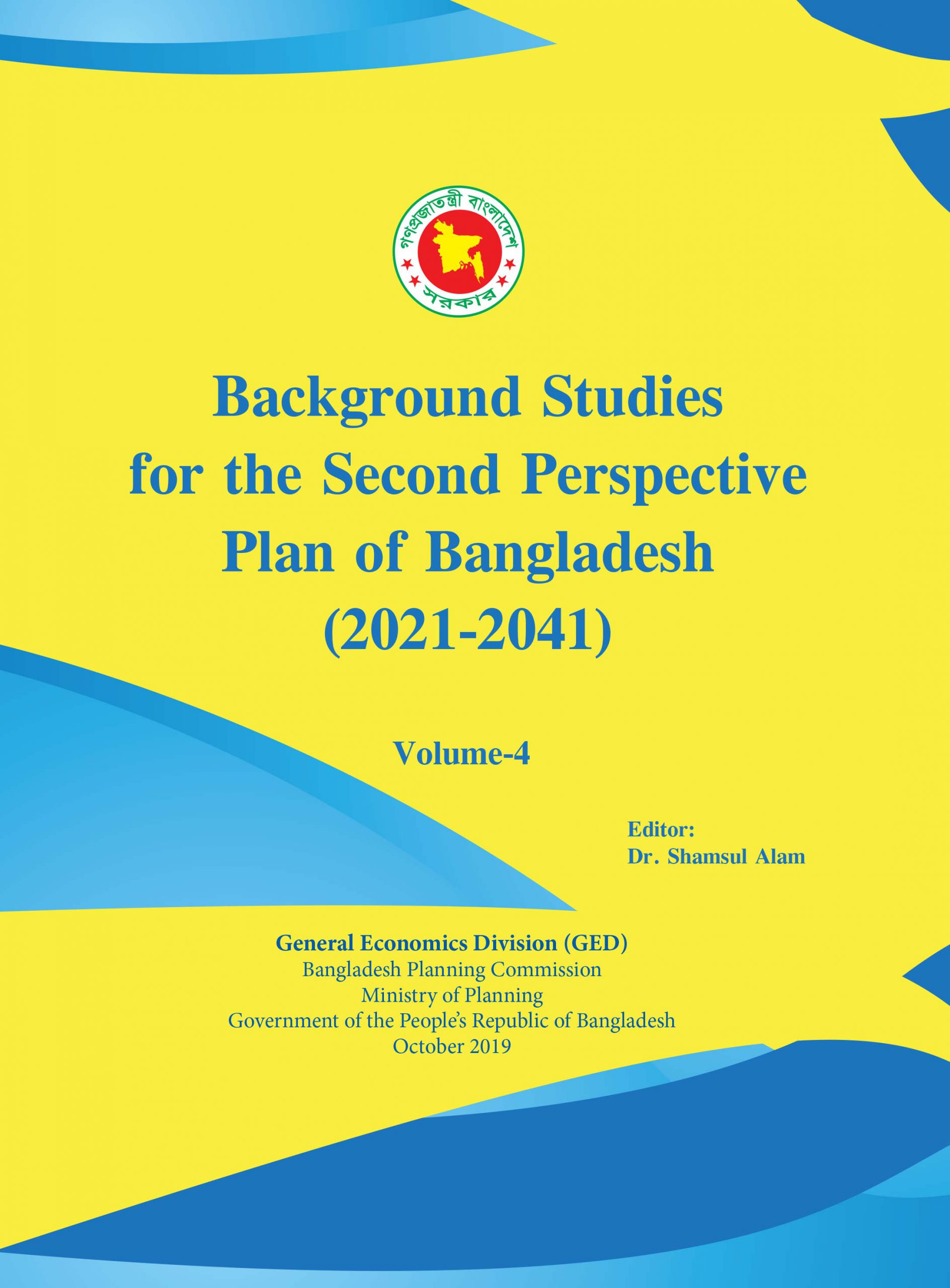
Background Studies for the Second Perspective Plan of Bangladesh (2021-2041): Volume-04
 September 6, 2022
September 6, 2022 These background studies provided valuable information/inputs which significantly contributed towards drafting the Second Perspective Plan. These studies are rich in contents and, if made available, will enrich the knowledge base relating to development challenges and development options facing Bangladesh. In view of the importance of these studies, it has been decided that GED will publish these studies for making these available to interested readers, researchers and academia. The background papers have been published in six separate volumes. It is expected that these volumes will help the readers to understand the rational for the choice of the specific domain underlying the Plan and the design of the policy package adapted for the Plan for reconciling the goals of effiency with those of equity. The studies attempted to spell out a reform strategy and agenda for agriculture, food security, industrialization, poverty reduction, social inclusion, transportation, quality infrastructure, sustainable management of natural resources, and other development issues like governance, gender, urban development, service sector development, health and population management, human development, ICT and information highway, employment and labour market in the light of current conditions as well as past experience trends.
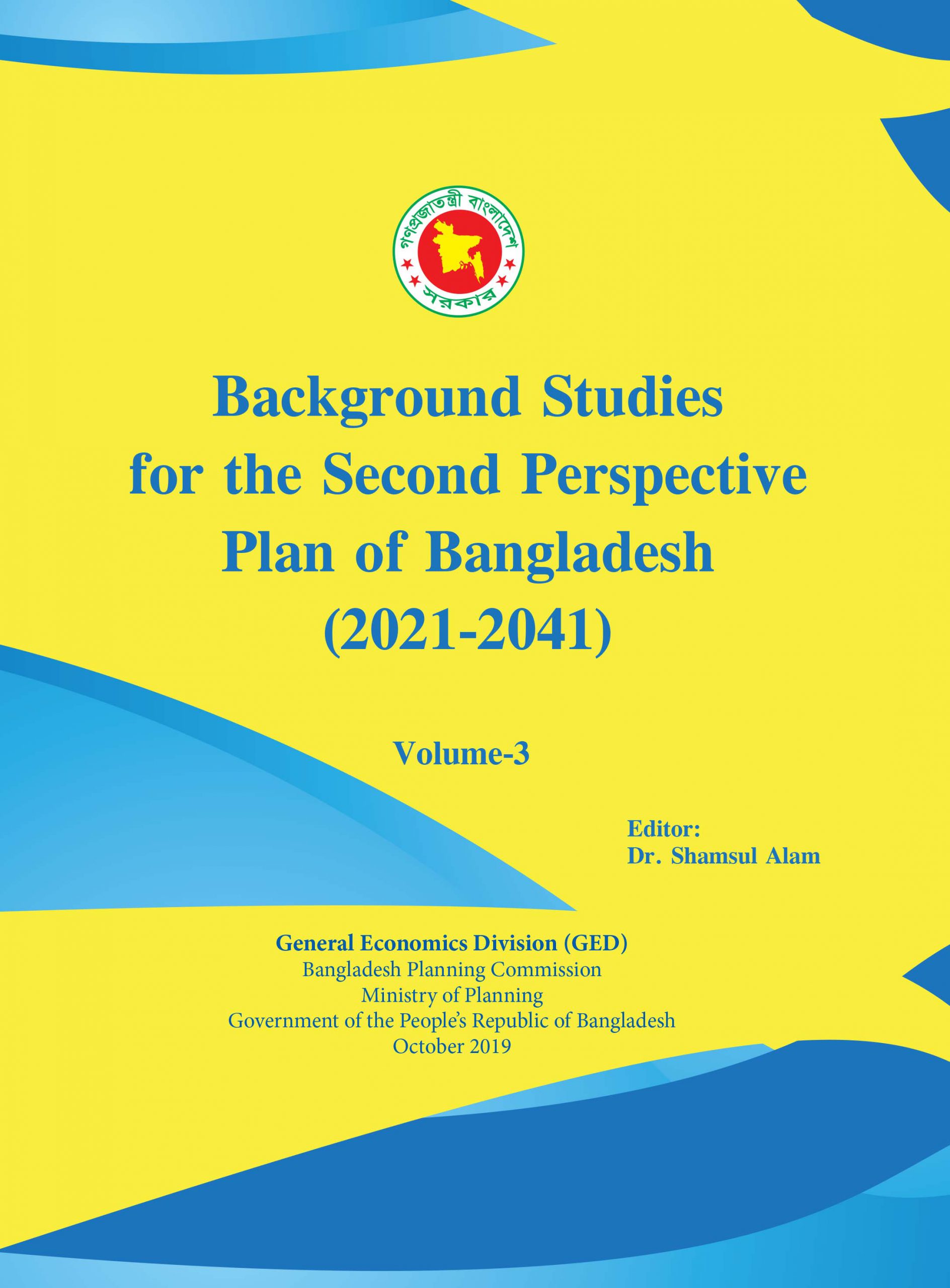
Background Studies for the Second Perspective Plan of Bangladesh (2021-2041): Volume-03
 September 6, 2022
September 6, 2022 These background studies provided valuable information/inputs which significantly contributed towards drafting the Second Perspective Plan. These studies are rich in contents and, if made available, will enrich the knowledge base relating to development challenges and development options facing Bangladesh. In view of the importance of these studies, it has been decided that GED will publish these studies for making these available to interested readers, researchers and academia. The background papers have been published in six separate volumes. It is expected that these volumes will help the readers to understand the rational for the choice of the specific domain underlying the Plan and the design of the policy package adapted for the Plan for reconciling the goals of effiency with those of equity. The studies attempted to spell out a reform strategy and agenda for agriculture, food security, industrialization, poverty reduction, social inclusion, transportation, quality infrastructure, sustainable management of natural resources, and other development issues like governance, gender, urban development, service sector development, health and population management, human development, ICT and information highway, employment and labour market in the light of current conditions as well as past experience trends.




